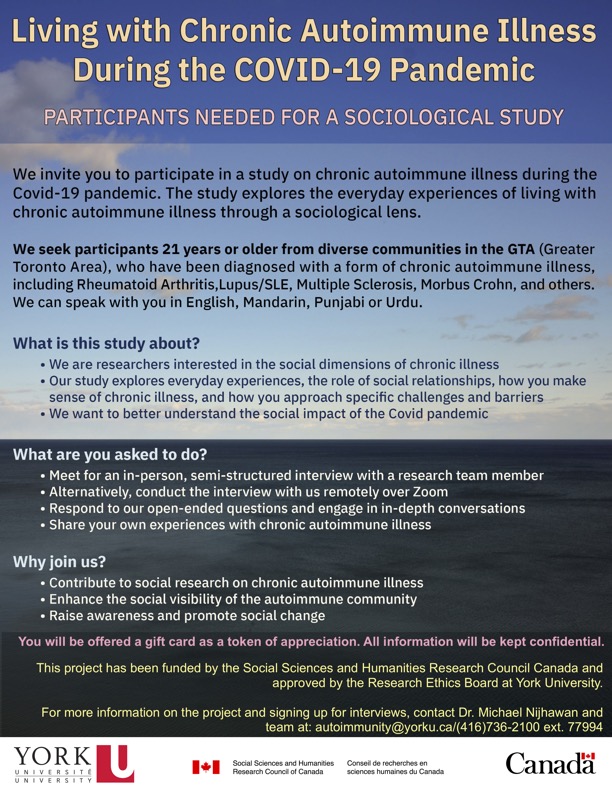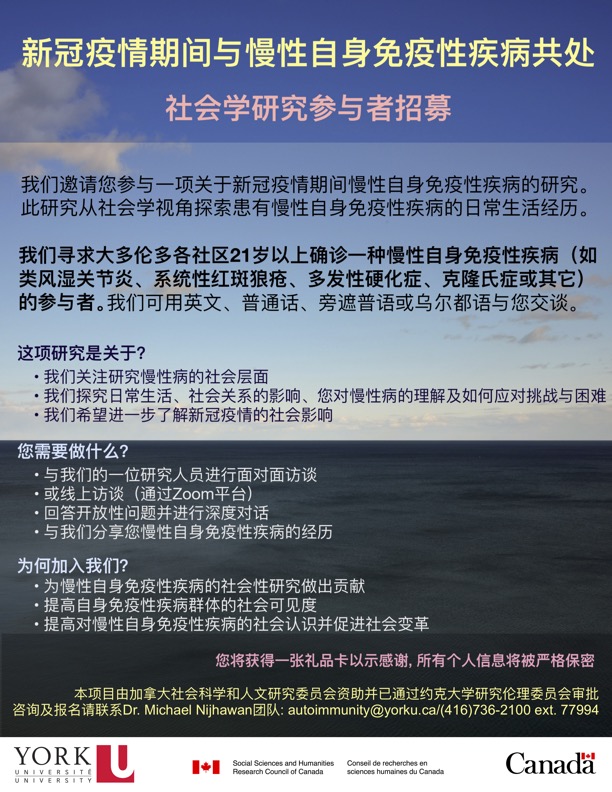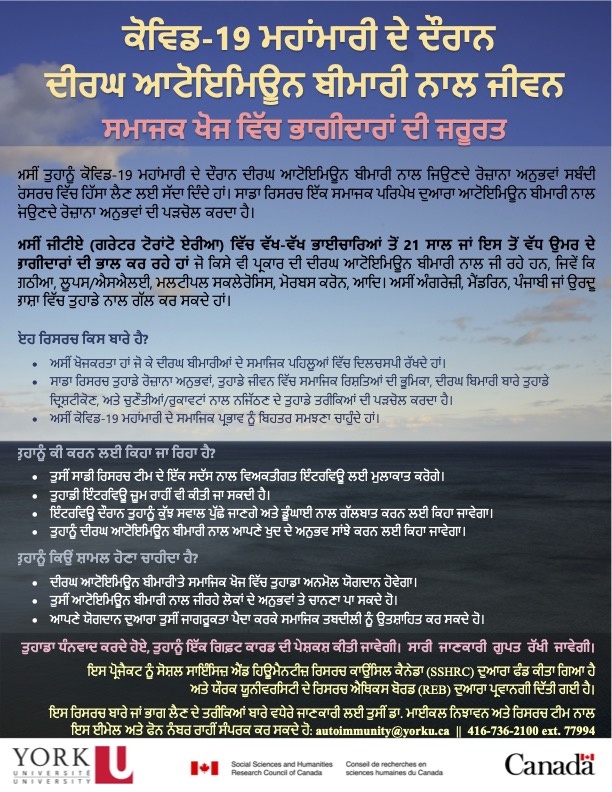AUTOIMMUNITY, SELF & SOCIETY
A Sociological Approach to Chronic Illness in the Wake of SARS-CoV-2
OUR RESEARCH
During the COVID-19 global pandemic, people with immunocompromised bodies are among the most vulnerable for having a comparatively higher risk of developing severe symptoms and facing greater uncertainties in social interactions and relationships. Nevertheless, within the chronic illness spectrum, people with autoimmune conditions are still underrepresented in public debates.
Our research study explores people’s experiences with chronic autoimmune illness in the Canadian context, before and during the COVID-19 pandemic. We examine how people with autoimmune conditions meet everyday life challenges, form social relations, and manage impacts of social institutions and policies.
We understand that social and political upheavals triggered by the pandemic are intertwined with existing forms of structural violence and social inequality on a global scale. Despite our collectively shared experiences of political polarizations, personal loss, and public health emergencies, there remain significant disparities in the relationship between health and socioeconomic status. Our project, therefore, investigates the impact of existing forms of social inequalities on the everyday life of people with chronic illness.
We ask:
- How do people with chronic autoimmune illness navigate the challenges of everyday life in varied ways and what are the implications on their wellbeing?
- How are their social lives and identities affected by prolonged periods of social distancing and isolation?
- How are persons with such medical conditions publicly and officially designated and how are their illnesses socially understood and constituted?
- How do existing socioeconomic barriers, historical marginalization, racialization, and various modes of ethnic/cultural belonging intersect in shaping the everyday experiences of people with autoimmune conditions?
This two-year project (2022–24) is funded by Social Sciences and Humanities Research Council of Canada’s (SSHRC) Insight Development opportunity and has been approved by the Research Ethics Board (REB) at York University.



ABOUT US
We are a group of researchers led by Dr. Michael Nijhawan, who has two decades of research experience with vulnerable communities. We come from different ethnic and cultural communities in the GTA and can speak with you in English, Mandarin, Punjabi, and Urdu.
RESEARCH TEAM
Principal Investigator:
Dr. Michael Nijhawan (Department of Sociology, York University) is a cultural sociologist with two decades of experience in qualitative research in the areas of migration, religion, violence/trauma, cultural identity and medical sociology. He is fluent in English and German and has good communication skills in Hindi, Urdu, Punjabi and French.
Research Assistants:
- Sana Hafeez is completing her master’s degree at York University in Heath Policy and Equity. Her research interests lie in food insecurity in the Greater Toronto Area. Sana has held leadership roles in community health organizations and is currently in a management position at United Way Greater Toronto. She is fluent in Urdu.
- Nishan Kaushall is in the doctoral program in Sociology at York University. His main research interests lie in the study of religion and secularism, postcolonial theory, political theory/theology, digital sociology and information technology. Nishan has worked closely with community organizations as a frontline social service worker to provide support services to families and at-risk youth in the GTA. He is fluent in Punjabi.
- Jennifer Weerasinghe is a Master of Arts candidate at York University in the Graduate Program in Sociology. Her main research areas are located within the sociology of education, with a specific interest in social reproduction, elitist education and social inequality. Jennifer has experience working in undergraduate mentorship during her undergraduate degree at the Glendon College of York University and she takes an active role in the Department of Sociology at York University through volunteering on committees. She is fluent in French.
- Dr. Yikun Zhao recently completed her doctoral degree in Sociology at York University. Her main research areas are cultural sociology and sociological theory. She has experience working as a volunteer on in-patient care at the Princess Margaret Cancer Centre and on women’s education. She is fluent in Mandarin.
CONTACT US
For more information on the project or to sign up for an interview, you can reach us via email at autoimmunity@yorku.ca or through our phone number at (416) 736-2100 ext. 77994
APPRECIATION
We would like to thank all of the community organizations that we have reached out to, for their generous support of our research project. Among them are:
